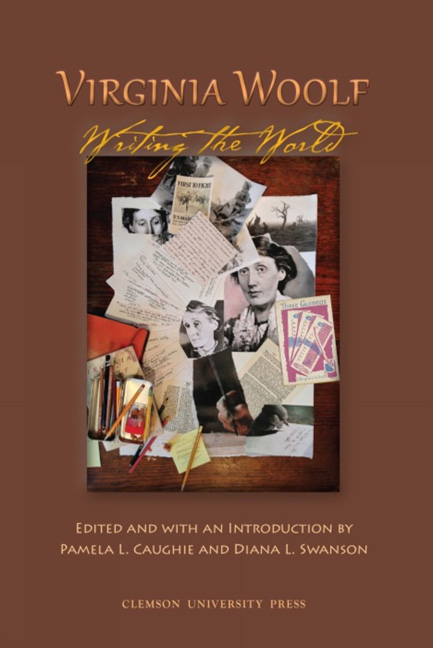Book contents
- Frontmatter
- Table of Contents
- Introduction
- Acknowledgmen
- Abbreviation
- WAR AND PEACE
- WORLD WRITER(S)
- Teaching Privileges: Three Guineas and the Cost of Global Citizenship
- From Guineas to Riyals: Teaching Woolf in the Middle East
- Fashionable Misconceptions: The Creation of the East in Virginia Woolf's Orlando
- From London to Taipei: Writing the Past in “Wandering in the Garden, Waking from a Dream” and Mrs. Dalloway
- An Estranged Intimacy with the World: The Postcolonial Woolf's Planetary Love in The Voyage Out
- “Shakespeare's Sister”: Woolf in the World Before A Room of One's Own
- Leonard Woolf: Writing the World of Palestine, Zionism, and the State of Israel
- ANIMAL AND NATURAL WORLD
- WRITING AND WORLDMAKING
- Notes on Contributors
- Conference Program
- Appendix: Virginia Woolf Conference Exhibit Items, Newberry Library
“Shakespeare's Sister”: Woolf in the World Before A Room of One's Own
from WORLD WRITER(S)
- Frontmatter
- Table of Contents
- Introduction
- Acknowledgmen
- Abbreviation
- WAR AND PEACE
- WORLD WRITER(S)
- Teaching Privileges: Three Guineas and the Cost of Global Citizenship
- From Guineas to Riyals: Teaching Woolf in the Middle East
- Fashionable Misconceptions: The Creation of the East in Virginia Woolf's Orlando
- From London to Taipei: Writing the Past in “Wandering in the Garden, Waking from a Dream” and Mrs. Dalloway
- An Estranged Intimacy with the World: The Postcolonial Woolf's Planetary Love in The Voyage Out
- “Shakespeare's Sister”: Woolf in the World Before A Room of One's Own
- Leonard Woolf: Writing the World of Palestine, Zionism, and the State of Israel
- ANIMAL AND NATURAL WORLD
- WRITING AND WORLDMAKING
- Notes on Contributors
- Conference Program
- Appendix: Virginia Woolf Conference Exhibit Items, Newberry Library
Summary
Virginia Woolf tells us in A Room of One's Own (1929) “a woman writing thinks back through her mothers” (97), an observation that took on allegorical weight in generations of feminist criticism establishing what Elaine Showalter famously called A Literature of Their Own, shifting the pronoun slightly to emphasize the need to construct a literary history of women's writing as a distinctive tradition. And yet, when we turn once again to A Room of One's Own, we must be struck by how entirely English Woolf's lineage of women writers is in this particular polemical essay. George Sand does make a momentary appearance, alongside Currer Bell and George Eliot, notable for their use of ambiguous or male pseudonyms. But her snapshots of women writing—from Lady Winchelsea and Margaret Cavendish to Austen, the Brontës, and the fictionalized Mary Carmichael—are resolutely English. And by “English,” I mean an ethnic and national designation, not only a linguistic one. How does this Englishness shape the reflections Woolf makes about women's writing more generally in A Room of One's Own? For a writer so deeply associated with a gender-based cosmopolitanism in Three Guineas (1938)—“as a woman I have no country. As a woman I want no country” (129)—Woolf's lineage of writing “mothers” in A Room of One's Own seems parochial, especially in the context of the 2014 Virginia Woolf Conference theme, Writing the World. A Room does not look back through literary mothers of the world beyond England, nor does it even consider the kinds of issues the resonant phrase “writing the world” suggests.
Virginia Woolf tells us in A Room of One's Own (1929) “a woman writing thinks back through her mothers” (97), an observation that took on allegorical weight in generations of feminist criticism establishing what Elaine Showalter famously called A Literature of Their Own, shifting the pronoun slightly to emphasize the need to construct a literary history of women's writing as a distinctive tradition. And yet, when we turn once again to A Room of One's Own, we must be struck by how entirely English Woolf's lineage of women writers is in this particular polemical essay. George Sand does make a momentary appearance, alongside Currer Bell and George Eliot, notable for their use of ambiguous or male pseudonyms. But her snapshots of women writing—from Lady Winchelsea and Margaret Cavendish to Austen, the Brontës, and the fictionalized Mary Carmichael—are resolutely English. And by “English,” I mean an ethnic and national designation, not only a linguistic one. How does this Englishness shape the reflections Woolf makes about women's writing more generally in A Room of One's Own? For a writer so deeply associated with a gender-based cosmopolitanism in Three Guineas (1938)—“as a woman I have no country. As a woman I want no country” (129)—Woolf's lineage of writing “mothers” in A Room of One's Own seems parochial, especially in the context of the 2014 Virginia Woolf Conference theme, Writing the World. A Room does not look back through literary mothers of the world beyond England, nor does it even consider the kinds of issues the resonant phrase “writing the world” suggests.
I propose, however, a diff erent framework for rethinking A Room of One's Own as a text that is both in the world and writes the world: namely Woolf's astounding ability to create iconic figures and tropes that travel to and incorporate the world. Woolf was a gifted phrase-maker, a crystallizer of concepts that she embodied in condense, resonant, unforgettable, image-based, metonymic or metaphoric terms: Shakespeare's sister; a room of one's own; 500 pounds a year; killing the angel in the house; Chloe liked Olivia[…]; she broke the sentence, she broke the sequence; the daughters of educated men; dead bodies and ruined houses; round and round the mulberry tree;…
- Type
- Chapter
- Information
- Virginia Woolf: Writing the World , pp. 122 - 127Publisher: Liverpool University PressPrint publication year: 2015



